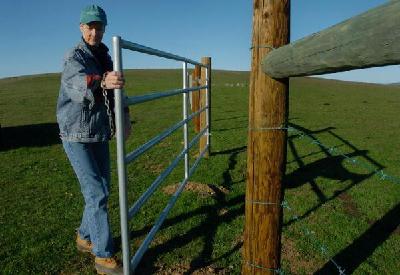Cheese producers hailed as model for West Marin development
 Marcia Barinaga opens the pasture gate on the Barinaga Ranch above Tomales Bay in Marshall. Barinaga and her husband, Corey Goodman, are planning a sheep ranch and cheese-making facility. The plan received county praise and approval last week. (IJ photo/Jeff Vendsel)
Marcia Barinaga opens the pasture gate on the Barinaga Ranch above Tomales Bay in Marshall. Barinaga and her husband, Corey Goodman, are planning a sheep ranch and cheese-making facility. The plan received county praise and approval last week. (IJ photo/Jeff Vendsel)
Rob Rogers
Marin Independent Journal
1/17/07
A Marshall couple has won approval for a sheep pasture and cheese processing facility on a former cattle ranch.
To property owners Marcia Barinaga and Corey Goodman, the new ranch is the fulfillment of a dream and the opportunity to join the growing number of artisan cheese producers in Marin County.
"We know there's a lot of high-quality cheese being made in Marin County right now," Goodman said. "But a lot of that is cow cheese. We don't think there's any other cheese made from sheep's milk in the county right now."
To county officials, the Barinaga Ranch represents the kind of development they want in the agricultural lands of West Marin: a family more interested in traditional farming than in building a country estate. A county zoning administrator approved the project Thursday.
"This project both fills a niche market and is in keeping with environmental stewardship, protecting the location for the production of food," said Community Development Director Alex Hinds. "It's a good model."
The 823-acre ranch was originally part of the 1,310-acre Barboni property, and William Barboni Jr. will continue to graze 47 to 70 pairs of beef cattle on the land.
Neither Barinaga nor Goodman have backgrounds in agriculture. Both hold doctorates in biology. Barinaga became a science journalist, while Goodman taught for 26 years at Stanford and the University of California at Berkeley, where he continues to serve as an adjunct professor of neurobiology.
In 2000, Goodman founded Renovis, a biotechnology company working to develop drugs to fight neurological and inflammatory diseases. He serves as president and CEO of the San Francisco-based company, and said that will continue to be his primary focus.
"This was driven by my wife - that's why it's called the Barinaga Ranch," Goodman said.
Barinaga said her decision to raise sheep came after the couple purchased the ranch in 2001.
"What happened was that once we owned the ranch, we spent some time in environmental improvement projects," Barinaga said. "Once we'd been on the land and started getting to know it, we fell in love with it.
"The (University of California) Cooperative Extension people were suggesting that we grow strawberries or organic apples - something to create a value-added product," Barinaga continued. "But none of those ideas grabbed me. When I suggested cheese, the Cooperative Extension folks got excited and said, 'That's a fabulous niche market!'"
Lynne Devereux, coordinator of the upcoming Artisan Cheese Festival for Marin and Sonoma counties, agreed.
"There is such demand for it, I can't even tell you," Devereux said. "I would encourage them that the market is wide open."
Sheep cheese is especially prized, Devereux said, because it has a higher fat content than cow's milk, and contains nutritional benefits that cow's milk doesn't.
"We import sheep cheese, typically from Spain and Italy," Devereux said. "Vermont is the only U.S. state with an established sheep cheese tradition. Sheep don't yield a lot of milk - even goats give more - so what they give is even more precious."
To Barinaga, however, the decision to become a cheesemaker gave her the opportunity to learn from her father, a Sonoma County winemaker.
"He was so excited when he heard we were planning to raise sheep," Barinaga said. "He said that back in Europe, everyone who owns sheep milks them. In the U.S., there are so many operations that produce lamb, but few of them milk their sheep. Sheep cheese is more abundant in the old country."
Barinaga set about creating a ranch plan and learning everything she could about raising sheep. She traveled to Idaho to practice shearing on a cousin's farm, and attended a cheesemaking class in Vermont. She and Goodman accompanied her father on a trip to the Pyrenees last summer in order to learn the secrets of cheesemaking from Basque masters.
"I've been a science reporter for 15 years, and the thing I always loved about reporting is that there's always a steep learning curve when you find a new subject for an article," Barinaga said. "I really like learning."
Within three years, the couple hopes to build a flock of 150 ewes with lambs.
"The breed is East Friesian. They're the Holsteins of sheep," Barinaga said.
The new ranch will include a single-story main house, housing for a single farm worker, barns for sheep and horses, and a 2,619-square-foot creamery and cheese processing facility - all designed within the county's "green building" guidelines. It will include six 5,000-gallon water tanks and two new septic systems, carefully constructed to avoid polluting nearby Tomales Bay.
The property is encumbered by the Marin Agricultural Land Trust (MALT), which limits the nonagricultural uses available on the land. Since purchasing the property in 2000, Barinaga and Goodman have worked closely with MALT representatives in developing an agricultural plan.
"This increases the agricultural productivity in the area," said Tony Nelson, a stewardship coordinator for MALT. "We're looking at this project as a model. We're very excited about this."
The couple also plans to fence off parts of Frink's Creek to sheep and cattle. Restricting livestock access to Marin's waters is one of the agricultural measures currently being advocated by several local environmental groups as part of an update to the countywide plan.
In addition to producing cheese, the couple plans to work toward making both its cow and sheep pastures organic, enabling them to sell grass-fed lamb and beef to specialty markets.
"There is a strong market and a strong demand for locally-produced, high-quality organic products," said Helge Hellberg, executive director of Marin Organic, an organization that supports Marin's organic farmers and ranchers. "Food choices matter to people here."
Barinaga and Goodman have received a warm welcome from other area ranching families, who recommended the project to county officials. Yet Barinaga believes she and her husband still have a long way to go to prove themselves worthy of the land and the traditions they've decided to embrace.
"We're not one of the original ranching families of West Marin," Barinaga said. "We don't have the same legacy as those families who have ranched for generations. We're going to have to work to gain the respect of those who know the history of this area in their bones. I'm so glad they've welcomed us into the community, and I look forward to learning something new every day.
"It saddens us to think there are ranchers leaving the county, that there are farmers selling ranches," she continued. "Our goal is to do our best to be good stewards of the land, and to be active and contributing members of the agricultural community."



